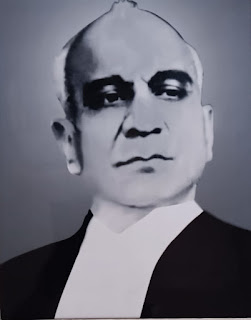 |
| Kanhaiya Lal Misra (31.08.1903 – 14.10.1975) |
In this and next post, we will briefly talk about life sketch of Kanhaiya Lal Misra and what I heard about him in the corridors of the Allahabad High Court.
In other tributes to KL Misra, different words for the same incident are used. However, they are equally, if not more praise worthy than my description.
Command Over Language Is An Asset
Life-Sketch
“It is the Englishman who had conquered India, but it is only KL Misra who conquered English.”
He was appointed Deputy Government Advocate in 1947, basically dealing with criminal matters. But when in 1951, constitutionality of Zamindari Abolition Act was challenged. PR Das was very eminent and perhaps the finest lawyer at that time. He came to argue it. He had successfully challenged the similar law in Patna. KL Misra was entrusted to defend it and he did defend it successfully, establishing himself as a great constitutional lawyer.
"Mr. Misra, why do you not come more often to the Supreme Court - the cases in which you appear, raises the standard of our judgement."
With Justice Earl Warren At Varansi
News paper Aaj dated 28-08-1956 published from Varanasi providing functions in honour of CJ Earl Warren and dignitaries present.
CJ Warren was hosted over lunch by Civil Bar Varanasi at Hotel De Paris and later addressed Law students at Banaras Hindu University. It was here, that he heard KL Misra. After hearing him, Chief Justice Warren remarked that if they had a counsel like KL Misra appearing in the US Supreme Court, they would waive the time limit every time he appeared.
With Lord Denning At Allahabad
 |
| CJ OH Mootham 1955-61 |
“We have taught English to the World but today your Advocate General taught it to me.”
The Golakhnath Case
During arguments, Palkhivala emphasised on the words ‘Constitution shall stand amended’ used in Article 368. It was to buttress his submissions that despite amendment, constitution survives and there are implied limitations to the amending power.
In the words of Nariman, when Kanhaiya Lal Misra got up to reply as advocate general of UP,
“He started his submissions in low key. He was not agitated. And after he stated his point, he poked fun at Palkhivala’s emphasis on the words shall stand amended; ‘What should it have said My Lords?’ he asked, in mock surprise. ‘Should the Clause have said that the Constitution shall sit amended?’He then went on, ‘No-no – My Lords. Plain English cannot be subverted to suit any particular point of view.’”






Sir, can we have access of writing of late Mishra sir?
ReplyDeleteKL Misra has not written much at least it is not available on the Internet. However, some articles written by him are available in the centenary volume of the High Court. You can find the on the publication page of the Allahabad High Court website at
ReplyDeletehttps://allahabadhighcourt.in/publications.html